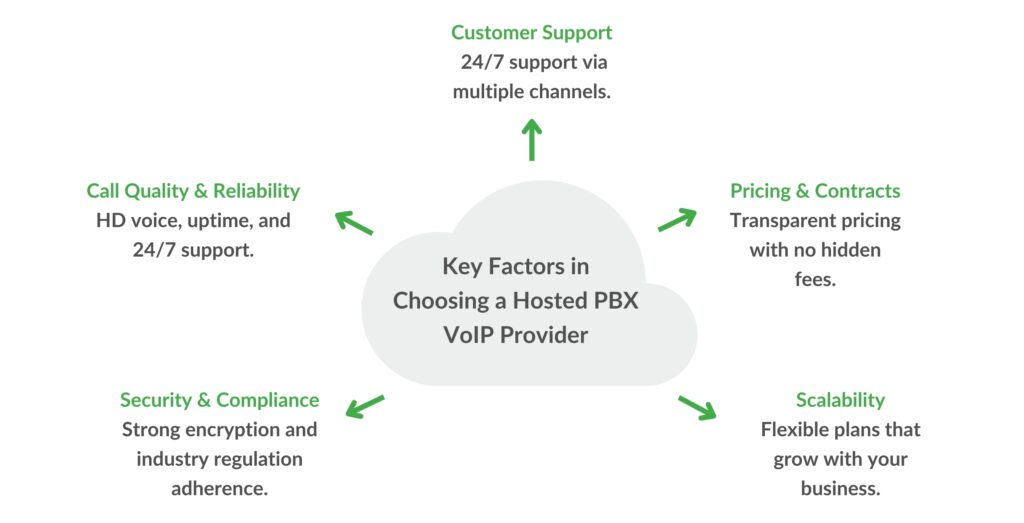Comparing Hosted PBX VoIP Providers: Choose the Best VoIP Service for Your Business

Introduction
Searching for a new business phone system can be a pain. You already have a million things to worry about, and knowing how to choose a VoIP provider feels overwhelming.
The growing adoption of remote and hybrid work models significantly drives demand for cloud-based communication solutions. As businesses need reliable and accessible tools to connect dispersed workforces across different locations, it’s more important than ever to enable seamless collaboration and communication regardless of physical proximity.
Hosted PBX VoIP is a cloud-based phone system that has become increasingly popular among businesses of all sizes. It offers numerous benefits, including cost-effectiveness, scalability, and flexibility, especially for remote employees.
In this guide, we’ll walk you through top providers and how to choose the best service for your organization’s unique needs.
Understanding Hosted PBX VoIP
- Defining Hosted PBX
Hosted PBX is a cloud-based telephone system hosted on your trusted VoIP service provider’s servers rather than on-premise hardware.
Unlike an on-premise PBX system, which requires your company to purchase and maintain its hardware and bear all maintenance and upkeep costs, your provider maintains a hosted PBX system.
A hosted PBX, also known as a cloud PBX, operates in the cloud. All phone lines, call routing, voicemail, and other functionality occur over the Internet rather than a local area network, reducing your business’s hardware expenses and IT labor costs.
- Benefits of Hosted PBX VoIP
If you’re running a business that has yet to switch to a Hosted PBX VoIP phone system, then you will undoubtedly be spending a lot of time, money, and effort just in maintaining your telephone system. Your IT resources will probably be pushed to the limit just keeping everything up and running when they could be more profitably used for building your business and gaining customers.
A hosted PBX VoIP system offers several benefits, including:
Cost Savings: Since the need to furnish your office building with expensive cabling, equipment, and infrastructure is negated, so is the cost. You hook up to the cloud, and off you go. Once you’re up and running with hosted PBX, you will not need to worry about the ongoing maintenance of your phone lines or employ an IT team to manage the system, as your service provider will take care of this.
Scalability: One of the most attractive features of hosted PBX for businesses is that the system is ultimately scalable without ever incurring extra costs for hardware and infrastructure. Your PBX system will grow seamlessly with your company. You can add more phone lines, extensions, and mobile connections as and when required, with no obligation to continue the extended service should your business not need it.
Mobility & Flexibility: Hosted PBX systems provide unparalleled mobility and flexibility, allowing businesses to support remote work and mobile employees. Since hosted PBX operates over the Internet, employees can connect to the system from anywhere with an Internet connection, making it an ideal solution for remote work environments. This flexibility ensures seamless communication regardless of location, keeping employees connected and productive from anywhere.
Advanced Features: Advanced calling features are essential in the modern business world, and hosted PBX provides them. With access to voicemail and email, auto attendant, music on hold, directory, remote call management, and voice messaging, there’s not much hosted PBX can’t do.
In addition, if you opt for a complete unified comms package, you will have access to additional features, including presence, messaging, conferencing, interactivity between voicemail and email, analytics, and more.
Key Factors to Consider When Choosing a Hosted PBX VoIP Provider
Several important factors should be considered when choosing a VoIP service provider. These factors will help you evaluate different providers and determine which best meets your business needs.
- Call Quality & Reliability
High call quality and reliability are essential. Look for a provider that offers HD voice and a solid uptime track record. Reliable service ensures your business operations run smoothly. Another key feature to consider when it comes to reliability is a provider that offers redundancy and 24/7 support for availability when/if your network goes down.
- Pricing & Contracts
Evaluate each VoIP provider’s pricing structure and consider whether they offer affordable plans that align with your budget. Look for transparent providers about their pricing, including any additional fees or charges. Compare the pricing plans of different providers to ensure you are getting the best value for your investment. When looking into pricing, feel free to request itemized quotes from multiple providers, so you have a better view of the landscape. Some IT Providers will help you do this through an RFI process.
- Scalability & Integrations
Scalability is essential for a growing business, so choose a VoIP provider that can easily accommodate your company’s expansion, whether you need to add new users, lines, or features. Look for providers that offer flexible plans and straightforward options for scaling up or down as your business needs change.
For example, some providers allow you to add or remove lines with a few clicks without requiring long-term contracts or hardware upgrades, ensuring that your communication system grows with you.
- Customer Support & Training
Effective customer support is vital. Choose a provider with 24/7 customer service and multiple support channels, including phone, email, and live chat. Good support can help resolve issues quickly, minimizing downtime.
- Security & Compliance
Choosing a service provider usually focuses on pricing and specific feature needs. However, as with any cloud service, VoIP network security must be prioritized when browsing vendors. When evaluating a hosted VoIP provider, key factors to consider regarding security and compliance include encryption standards used for call data, adherence to industry regulations like HIPAA, PCI-DSS, and GDPR, robust network security measures, data center security, strong authentication practices, and transparent security policies outlining their practices to protect customer data.
2024/2025 Market Statistics & Trends
The VoIP market is rapidly growing. The telecommunications industry is witnessing a massive shift in consumer demand to transition from landline to wireless and VoIP call services. According to a report by PS Market Research, from 2025 to 2032, the growth rate of the hosted PBX market will be 16.8%.
The VoIP market is steadily growing, with almost no signs of stopping or slowing down anytime soon. The number of people using VoIP services is increasing daily, and this trend will only continue over the next few years.

Comparing Hosted PBX VoIP Providers
The best hosted PBX providers deliver an intuitive virtual platform with advanced calling features, app integrations, and multichannel capabilities (e.g., video meetings and team chat). Starting at $10 per user monthly, hosted PBX VoIP enhances a business’ flexibility, allowing it to manage its phone systems from anywhere. Here are some highlights of a few top-rated providers:
- Zoom Phone
When Zoom conquered video conferencing in the early 2020s, their next move was to expand into VoIP services. Zoom Phone was launched before the pandemic so customers could add VoIP phone capabilities to Zoom’s existing video conferencing platform.
Pros: Seamless for existing Zoom users, robust feature set.
Cons: It may have a higher price tag for small startups.
Ideal For: Remote teams that heavily rely on Zoom’s ecosystem.
- 8×8
8×8 is a robust unified communications system and contact center solution built to scale. It offers unlimited calling to 14 countries, and conference calls with up to 500 active participants right out of the box. It’s also secure, reliable, and backed by a 99.999% uptime SLA. 8×8 is a strong choice for global businesses and contact centers with high-volume international calling and large meeting requirements.
Pros: Competitive pricing and easy scalability for small and midsize businesses.
Cons: Limited availability of certain premium features on basic tiers.
Ideal For: Growing businesses wanting straightforward, budget-friendly options.
- Other Noteworthy Providers
RingCentral: RingCentral is a leading cloud-based communications platform that provides businesses with a comprehensive suite of tools. It offers unlimited calling, team messaging, enhanced business SMS, toll-free business lines, and document sharing, all designed to improve collaboration and streamline communication.
Nextiva: This versatile and reliable platform is used by various organizations, including small businesses, startups, and even NFL teams, to modernize customer communication. Its customer service teams are top-notch.
The platform offers a broad set of features for team collaboration, customer communication, and contact management, all easily accessible through a unified dashboard.
Vonage Business: Vonage is a top-rated cloud phone system due to its extensive in-house features—including fraud prevention, onboarding, cross-platform messaging tools—and its library of third-party integrations. The platform’s impressive toolkit makes it a powerful option for businesses managing high volumes of calls and those looking to expand.
Decision-Making Tips & Cost-Benefit Analysis
- Evaluate Business Needs
Before selecting a VoIP system, it’s essential to understand your business needs and objectives. Consider the following questions:
- What is the size of your business?
- How many employees will use the VoIP system?
- What are your current and future communication needs?
- Do you require advanced features such as video conferencing or CRM integration?
- Total Cost of Ownership (TCO)
The total cost of ownership or TCO primarily refers to the overall sum of procuring, deploying, and operating the VoIP (Voice over Internet Protocol) system over its life cycle. You can anticipate the total cost of ownership by evaluating the following:
- Upfront costs
- Deployment costs
- Cost of Operational Use
- Test & Trial Periods
When choosing a hosted VoIP provider, requesting and taking advantage of demos is crucial to assess the call quality, user interface, features, and overall functionality of the system before committing, ensuring it aligns with your business needs and expectations; pay particular attention to call clarity, ease of navigation, and the provider’s ability to address your specific requirements during the demo process
- Negotiation & Scalability
Navigating the complexities of VoIP provider contracts can be daunting for businesses. Various terms and conditions influence the overall service experience and cost. Understanding and negotiating these contracts is crucial to ensuring that the terms align with your business’s needs and expectations, especially if you expect rapid business expansion in the next 1–2 years.
Conclusion
Almost every organization has a business phone system for communication needs. The communications system you choose for your business will play a pivotal role in building relationships with your vendors, partners, and customers—those relationships will determine your business’s success. So, if you compare hosted PBX VoIP providers, finding a service provider to help you strengthen those relationships at every turn is essential.
Looking for personalized advice or guidance on your VoIP needs? Contact Plow Networks today! Whether you’re exploring VoIP solutions or need a tailored consultation, we’re here to help.
You can schedule a discovery call or start the RFI process through our website here. Let us help you find the best communication solution for your business!
Explore more on:





